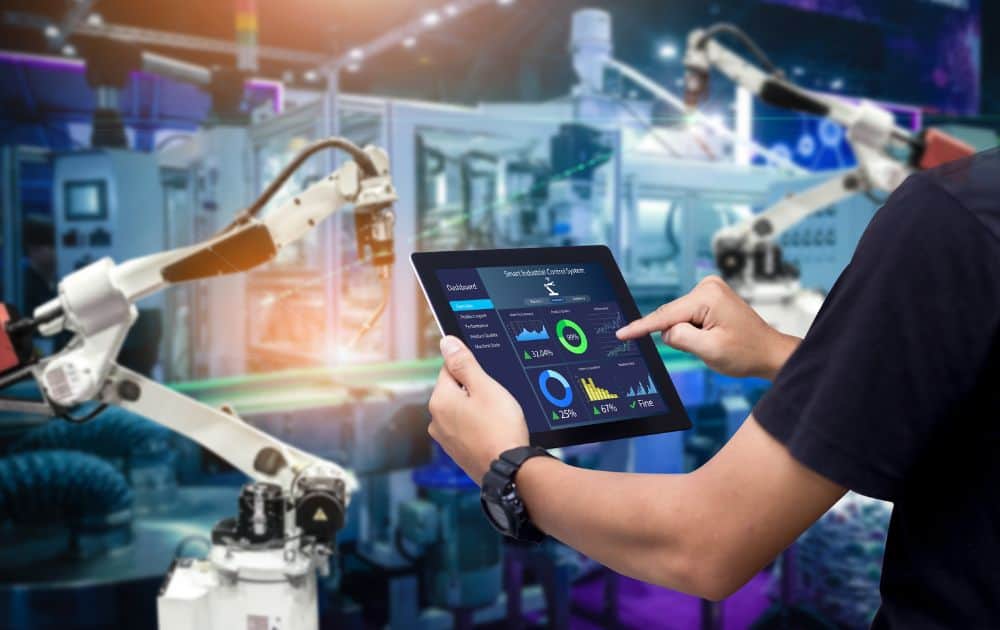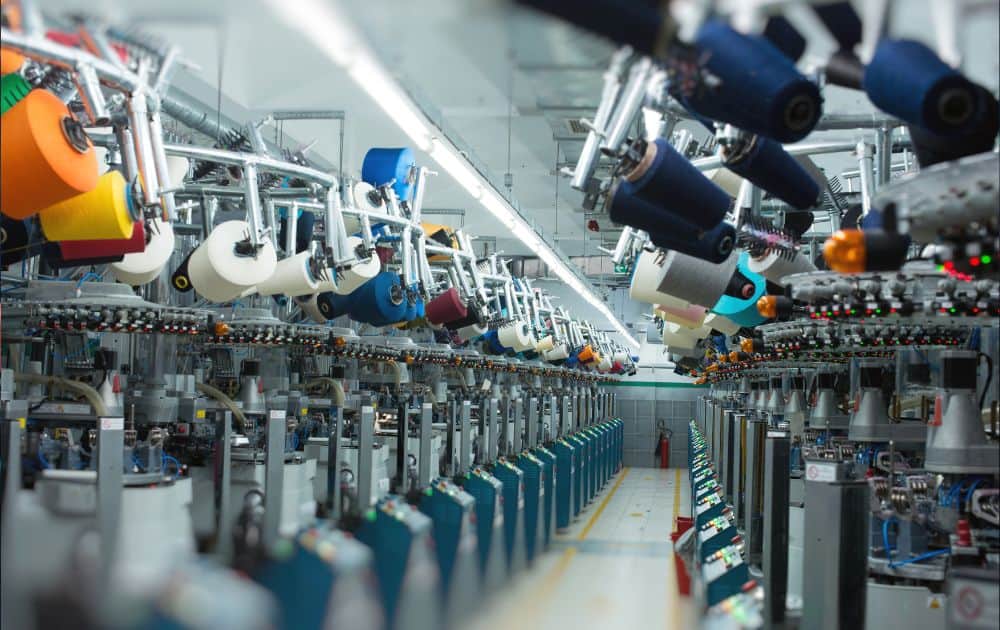Manufacturing practices have come a long way over the years, shaped by advancements in technology and the growing influence of information technology (IT). In this article, we will explore the traditional manufacturing practices that laid the foundation for modern global manufacturing, as well as the significant impact of information technology on the industry.

Traditional Manufacturing Practices
Traditional manufacturing practices were characterized by manual labor and a reliance on mechanical systems. These practices involved processes such as handcrafting, assembly lines, and mass production techniques. While effective at the time, these practices had limitations in terms of efficiency, productivity, and flexibility.
The Impact of Information Technology
The emergence of information technology has revolutionized the global manufacturing landscape. It has brought about a paradigm shift, enabling manufacturers to enhance their operations, improve efficiency, and gain a competitive edge. The role of information technology in global manufacturing can be seen in various aspects:
- Automation and Robotics: Information technology has enabled the widespread adoption of automation and robotics in manufacturing processes. Automated systems and robotic technologies have significantly improved efficiency, accuracy, and productivity. They can perform repetitive tasks with precision, freeing up human workers to focus on more complex and value-added activities.
- Supply Chain Management Systems: Information technology has revolutionized supply chain management, streamlining processes and improving coordination. Advanced software systems enable real-time tracking of inventory, demand forecasting, order management, and logistics optimization. These systems improve efficiency, reduce costs, and enhance customer satisfaction by ensuring timely delivery of products.
Information technology has not only transformed traditional manufacturing practices but also paved the way for new opportunities and innovations. In the following sections, we will delve deeper into the specific areas where information technology has made a significant impact, such as data analytics, connectivity, collaboration, cybersecurity, and future trends in IT for manufacturing.
Enhancing Efficiency with IT
In today's global manufacturing landscape, information technology (IT) is pivotal for boosting efficiency and streamlining operations. Manufacturers can achieve higher productivity levels by harnessing automation, robotics, and advanced supply chain management systems to optimize processes.
Automation and Robotics
Automation and robotics are revolutionizing the manufacturing industry, enabling businesses to automate repetitive tasks and improve overall efficiency. By implementing automated systems and robotic technologies, manufacturers can achieve precise and consistent results, reduce human error, and increase production speed.
Robotic systems can perform a wide range of tasks, from assembly and packaging to material handling and quality control. These robots can work alongside human workers, taking on physically demanding or hazardous tasks, thereby improving worker safety and reducing the risk of accidents.
With automation, manufacturers can optimize their manufacturing processes, reduce costs, and enhance overall productivity. By integrating automated systems into their operations, manufacturers can achieve higher output levels, shorter production cycles, and improved product quality.
Supply Chain Management Systems
Effective supply chain management is essential for global manufacturing success. Information technology plays a pivotal role in streamlining and optimizing supply chains, enabling manufacturers to meet customer demands efficiently and effectively.
Supply chain management systems provide manufacturers with real-time visibility into their supply chain, allowing them to track inventory levels, monitor production schedules, and manage logistics operations. These systems help manufacturers optimize their inventory management, reduce stockouts and excess inventory, and improve overall supply chain efficiency.
Advanced analytics and forecasting techniques within supply chain management systems enable manufacturers to make data-driven decisions, optimize demand planning, and enhance supply chain responsiveness. This results in improved customer satisfaction, reduced lead times, and increased profitability.
Through the integration of automation, robotics, and supply chain management systems, manufacturers can supercharge their global operations and achieve higher levels of efficiency. Embracing these technologies enables manufacturers to stay competitive in the rapidly evolving global manufacturing landscape.
Data Analytics in Manufacturing
One of the key areas where IT has made a significant impact is data analytics. By harnessing the power of data, manufacturers can gain valuable insights that drive decision-making and enhance operational performance.
Predictive Maintenance
Predictive maintenance is a data analytics technique that utilizes advanced algorithms and machine learning to anticipate equipment failures and schedule maintenance activities accordingly. Manufacturers can detect potential issues by analyzing historical data and real-time sensor readings to identify patterns and indicators.
The benefits of predictive maintenance are numerous. By proactively addressing maintenance needs, manufacturers can minimize unplanned downtime, reduce repair costs, and optimize overall equipment effectiveness (OEE). This approach also enables better resource allocation, as maintenance activities can be scheduled during planned downtime or low-demand periods.
To implement predictive maintenance successfully, manufacturers need to invest in robust data collection systems and analytics tools. These systems gather data from various sources, such as sensors, equipment logs, and maintenance records. Advanced analytics algorithms then process the data, providing actionable insights and generating alerts when anomalies or potential failures are detected.
Quality Control and Optimization
In the manufacturing industry, ensuring high product quality is paramount. Data analytics plays a pivotal role in quality control and optimization processes. Manufacturers can uncover trends, patterns, and anomalies affecting product quality by analyzing production data.
Quality control analytics allows manufacturers to monitor key performance indicators (KPIs) and implement real-time quality checks. By continuously monitoring production processes and analyzing data, manufacturers can identify deviations from desired quality standards and take corrective actions promptly.
Optimization analytics, on the other hand, focuses on maximizing production efficiency and reducing waste. Analyzing production data allows manufacturers to pinpoint bottlenecks, optimize workflows, and allocate resources more effectively. This approach minimizes production costs and boosts overall productivity.
To effectively leverage data analytics for quality control and optimization, manufacturers need to integrate data from various sources, such as production machines, quality sensors, and inspection systems. This data is then processed using advanced analytics techniques, including statistical analysis and machine learning algorithms, to extract actionable insights.
Connectivity and Collaboration
In global manufacturing, information technology (IT) is crucial for enhancing connectivity and collaboration among stakeholders. This section examines two key aspects enabled by IT: the Internet of Things (IoT) and smart manufacturing, along with virtual reality (VR) and remote collaboration.
IoT and Smart Manufacturing
The Internet of Things (IoT) has revolutionized the manufacturing landscape by connecting machines, devices, and systems to collect and exchange data in real-time. Smart manufacturing leverages IoT technologies to optimize production processes, enhance efficiency, and enable predictive maintenance.
IoT-enabled sensors embedded in machinery can monitor performance, collect data, and provide insights into potential issues. This data is then analyzed, enabling manufacturers to identify patterns, predict maintenance needs, and proactively address equipment failures. By adopting IoT and smart manufacturing practices, manufacturers can minimize downtime, streamline operations, and improve overall productivity.
Furthermore, IoT facilitates the integration of supply chain systems, enabling seamless communication and collaboration between suppliers, manufacturers, and distributors. This interconnectedness enables real-time tracking of inventory, demand forecasting, and efficient logistics management.
Virtual Reality and Remote Collaboration
Virtual Reality (VR) technology has the potential to revolutionize collaboration in global manufacturing. By creating immersive virtual environments, VR enables remote teams to collaborate in real-time, regardless of geographical boundaries. Manufacturers can conduct virtual meetings, design reviews, and training sessions, improving communication and reducing the need for travel.
In manufacturing, VR can be used for virtual prototyping and simulation, allowing engineers and designers to visualize products and processes before physical production. This helps identify potential design flaws, optimize production lines, and minimize costly errors. Additionally, VR-based training programs can enhance employee skills and safety awareness in a controlled and realistic virtual environment.
Remote collaboration tools, coupled with VR, enable experts to remotely assist manufacturing teams in troubleshooting issues, reducing downtime, and accelerating problem-solving. By leveraging VR and remote collaboration, manufacturers can tap into a global talent pool, optimize resource allocation, and foster innovation in a cost-effective manner.
As manufacturing becomes increasingly interconnected, IT infrastructure that supports connectivity and collaboration is essential for success in the global marketplace. The integration of IoT and smart manufacturing practices, along with the adoption of VR and remote collaboration technologies, empowers manufacturers to enhance productivity, streamline operations, and drive innovation in a rapidly evolving industry.

Cybersecurity in Manufacturing
As information technology plays a crucial role in global manufacturing, it is essential to address the cybersecurity concerns that arise with increased connectivity and digitization. Protecting intellectual property and securing operational systems are two key aspects of cybersecurity in the manufacturing industry.
Protecting Intellectual Property
Intellectual property (IP) is a valuable asset for manufacturers, encompassing proprietary designs, manufacturing processes, and trade secrets. Protecting this IP is critical to maintaining a competitive advantage and preventing unauthorized use or theft.
Manufacturers can employ various cybersecurity measures to safeguard their intellectual property. These measures include:
- Access Controls: Implementing access controls to restrict unauthorized access to sensitive information and systems. This can involve user authentication mechanisms, such as multi-factor authentication, to ensure that only authorized individuals have access.
- Encryption: Utilizing encryption techniques to secure data both at rest and in transit. Encryption transforms data into unreadable formats, making it difficult for unauthorized parties to decipher.
- Intrusion Detection Systems: Deploying intrusion detection systems that monitor network traffic and identify suspicious activities or potential cyber threats. These systems can help detect unauthorized attempts to access or tamper with intellectual property.
- Employee Training and Awareness: Providing comprehensive training and awareness programs to employees regarding the importance of protecting intellectual property. This includes educating them about potential cybersecurity risks, phishing attacks, and best practices for maintaining data security.
Securing Operational Systems
In addition to protecting intellectual property, manufacturers must also focus on securing their operational systems. Operational systems include manufacturing equipment, control systems, and other critical infrastructure necessary for the production process.
To ensure the security of operational systems, manufacturers can implement the following cybersecurity practices:
- Network Segmentation: Segmenting networks to isolate operational systems from non-critical networks, such as office networks or guest networks. This helps contain potential cyber threats and prevent unauthorized access to operational systems.
- Regular Software Updates: Keeping operational systems up to date with the latest software patches and security updates. Software vulnerabilities can be exploited by cyber attackers, and regular updates help mitigate these risks.
- Backup and Disaster Recovery: Implementing robust backup and disaster recovery solutions to ensure that critical operational data and configurations are regularly backed up and can be restored in the event of a cybersecurity incident or system failure.
- Continuous Monitoring: Employing continuous monitoring systems to detect any anomalous behavior or potential cybersecurity incidents in real-time. This enables manufacturers to respond promptly to any security breaches and minimize the impact on operational systems.
Prioritizing the protection of intellectual property and securing operational systems allows manufacturers to mitigate cybersecurity risks and ensure seamless manufacturing processes. Implementing these cybersecurity measures, alongside other improvements in IT infrastructure, helps optimize global manufacturing operations.
Empower Your Manufacturing Operations with LK Tech
Discover how LK Tech enhances global manufacturing through advanced IT solutions. From cybersecurity to operational efficiency, our tailored IT services optimize your production processes.
Contact us today at (513) 769-7100 or email hello@LKTechnologies.com to secure your manufacturing operations with our expert IT support. Explore our comprehensive IT services in Cincinnati and upgrade your manufacturing capabilities today!


